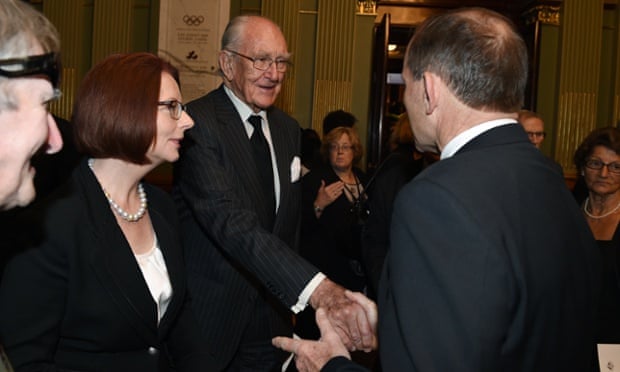By Mungo MacCallum Tuesday 31 March 2015
Photo: Prime Minister Tony Abbott faces the prospect of delivering two dud budgets with a third soft option in the election year to come. (Torsten Blackwood, file photo: AFP)
Abbott's chronicle of broken promises and policy retreats have made it impossible to regain the electorate's trust in the foreseeable future; indeed, he seems not even interested in trying, writes Mungo MacCallum.
After all the build up, ballyhoo and bluster, it turned out to be a bit of a fizzer: small NSW election, not many hurt.
As widely predicted Mike Baird, Australia's most popular leader (let's face it, Australia's only popular leader) won a very comfortable majority. Even the celebrations seemed a little muted; there were desultory chants of "four more years" and a flashing smile from Julie Bishop, but Baird's neighbour and somewhat distant friend Tony Abbott was not in attendance, preferring to indulge in his Lycra fetish somewhere in the deep south.
But he must have been mightily relieved; after the tsunamis of Victoria and Melbourne, a swing of a mere nine per cent in his own state could be, and will be, shrugged off as a win. In practice the result was right in the middle of the expected range - it restored respectability to Labor, but that was about all.
The new opposition leader Luke Foley gave all the TV appearances of being a personable and plausible candidate, but he did not, as they say, cut through; according to all the polls the voters retained serious doubts about privatisation and about Abbott, but they were not ready to forgive Foley's predecessors and former colleagues for their previous atrocities.
As a corollary, the Greens ended up outpolling Labor in a number of electorates and may have gained as many as two extra seats, one of them from what was considered safe National heartland in the Northern Rivers where I reside. The extraordinary and unprecedented push to resist coal seam gas simply swept the incumbents away.
But there was no state-wide movement; indeed, individual seats went all over the place, with Liberals actually gaining ground in some seats. Baird and his supporters are, as always is the case, claiming that their majority constitutes a mandate to go ahead with selling off the poles and wires, but in fact the circumstances make it clear that their demand is even more tenuous than usual.
For starters, the punters have made it abundantly clear that they just don't want it: they like Baird, but they also like the public ownership of assets and they would like to have both. Foley has promised to maintain his anti-privatisation stance, on the basis that if Baird has a mandate to sell, he has mandate to resist; and he has a point. New South Wales does not have a winner-takes-all system; that is the reason that we have a second chamber of government, the Legislative Council.
If the Coalition doesn't squeak through with an upper house majority there will be prolonged, bargaining, dickering, bribery and cajolery - far from the honourable campaign both the leaders praised on Saturday night. Mike Baird has certainly won the election, but he has yet to win the argument.
He has, however, been honest and upfront about it, which is where Tony Abbott comes in. Comparisons, Dogberry famously pointed out, are odorous, and those related to our prime minister are particularly smelly. Abbott's chronicle of broken promises and policy retreats have made it impossible to regain the electorate's trust in the foreseeable future; indeed, he seems not even interested in trying.
In parliament last week he flatly denied that he had ever said that an outcome of some 50 to 60 per cent of debt over GDP would be a pretty good result. In fact there was not only a crowd of witnesses but the transcript from his own office to attest that he had, which means that our prime minister is, in the delicate words of Winston Churchill, either labouring under a misapprehension or perpetrating a terminological in exactitude: or to put it more plainly, he is either a fool or a liar, if not both.
Neither will inspire confidence as his government prepares for the string of hints, softening up, kite flying and leaks, both contrived and malicious, which will traditionally take place over the next five and half weeks before the hapless Joe Hockey reveals his second budget. And when he does, it seems hard to see how it too, can be anything but an anticlimax.
It is improbable that it will be an inspiration to excite the imagination of the millions; instead, we have been promised, it will be dull - no excuses, no surprises. And indeed it seems that the goodies - a bit of childcare for the punters, a small tax cut for small business - have already been unwrapped. The children have not exactly been overwhelmed with delight and gratitude, and but even if they get the odd stocking filler in May, they are not going to be satisfied.
They will want more, and if there is any vestige of economic responsibility remaining in the treasury coffers, they just won't get it. There are unlikely to be tough decisions; indeed, given Abbott's self-contradictory rhetoric since the return of good government there may not be any serious decisions at all. But there won't be any bonanza either, such is the imperative from the Coalition's bankers and brokers.
So, two dud budgets with the certainty of a third soft option in the election year to come. And they called Malcolm Fraser's time the wasted years; at least he left a legacy, albeit one the Libs have never really appreciated. So what is Abbott's own memorial likely to be? Abolishing a couple of necessary taxes, increasing debt and deficit with no real prospect of an end ("as soon as possible," in Hockey's latest never-never forecast) and, of course, stopping, or rather re-stopping, the boats.
Against that miserable record even Mike Baird's Clayton's privatisation of leasing 49 per cent of the state's poles and wires can be spun as reform and has been, while Abbott just goes on pedalling madly towards nowhere in particular. You would have to wonder why he bothers; or why his colleagues continue to put up with it. Or, for that matter, why we do.
Mungo MacCallum is a political journalist and commentator.
Tony Abbott faces his own 'wasted years' - The Drum (Australian Broadcasting Corporation)
 Photo: Senator Lambie has applied to form her own political party, called the Jacqui Lambie Network. (AAP: Alan Porritt)
Photo: Senator Lambie has applied to form her own political party, called the Jacqui Lambie Network. (AAP: Alan Porritt)  Photo: No one will thank Tony Abbott if the NSW Coalition has a comfortable win this weekend, but all will blame him if they don't. (AAP: Lukas Coch)
Photo: No one will thank Tony Abbott if the NSW Coalition has a comfortable win this weekend, but all will blame him if they don't. (AAP: Lukas Coch)  Photo: Joe Hockey's presentation to colleagues said the Government would get the budget back to surplus as soon as possible. (File photo) (AAP: Dan Himbrechts)
Photo: Joe Hockey's presentation to colleagues said the Government would get the budget back to surplus as soon as possible. (File photo) (AAP: Dan Himbrechts) 






 Photo: There is a strong argument to be made for tightening eligibility for the age pension. (AAP: Alan Porritt)
Photo: There is a strong argument to be made for tightening eligibility for the age pension. (AAP: Alan Porritt)  Photo: The Prime Minister's news conference Wednesday was the most important he has held all year. (AAP: Lukas Coch)
Photo: The Prime Minister's news conference Wednesday was the most important he has held all year. (AAP: Lukas Coch)  Photo: Tony Abbott immediately withdrew the remark objected to by the Opposition. (AAP: Lukas Coch)
Photo: Tony Abbott immediately withdrew the remark objected to by the Opposition. (AAP: Lukas Coch)  Photo: Shadow Attorney-General Mark Dreyfus during Question Time. (AAP: Lukas Coch)
Photo: Shadow Attorney-General Mark Dreyfus during Question Time. (AAP: Lukas Coch)  Photo: There are awkward questions for governments still defining themselves as the reform successors of Hawke and Keating. (William West: AFP)
Photo: There are awkward questions for governments still defining themselves as the reform successors of Hawke and Keating. (William West: AFP)  Photo: Thinking moving your internet service a few kilometres down the road is easy? Wrong. (Reuters)
Photo: Thinking moving your internet service a few kilometres down the road is easy? Wrong. (Reuters) 

